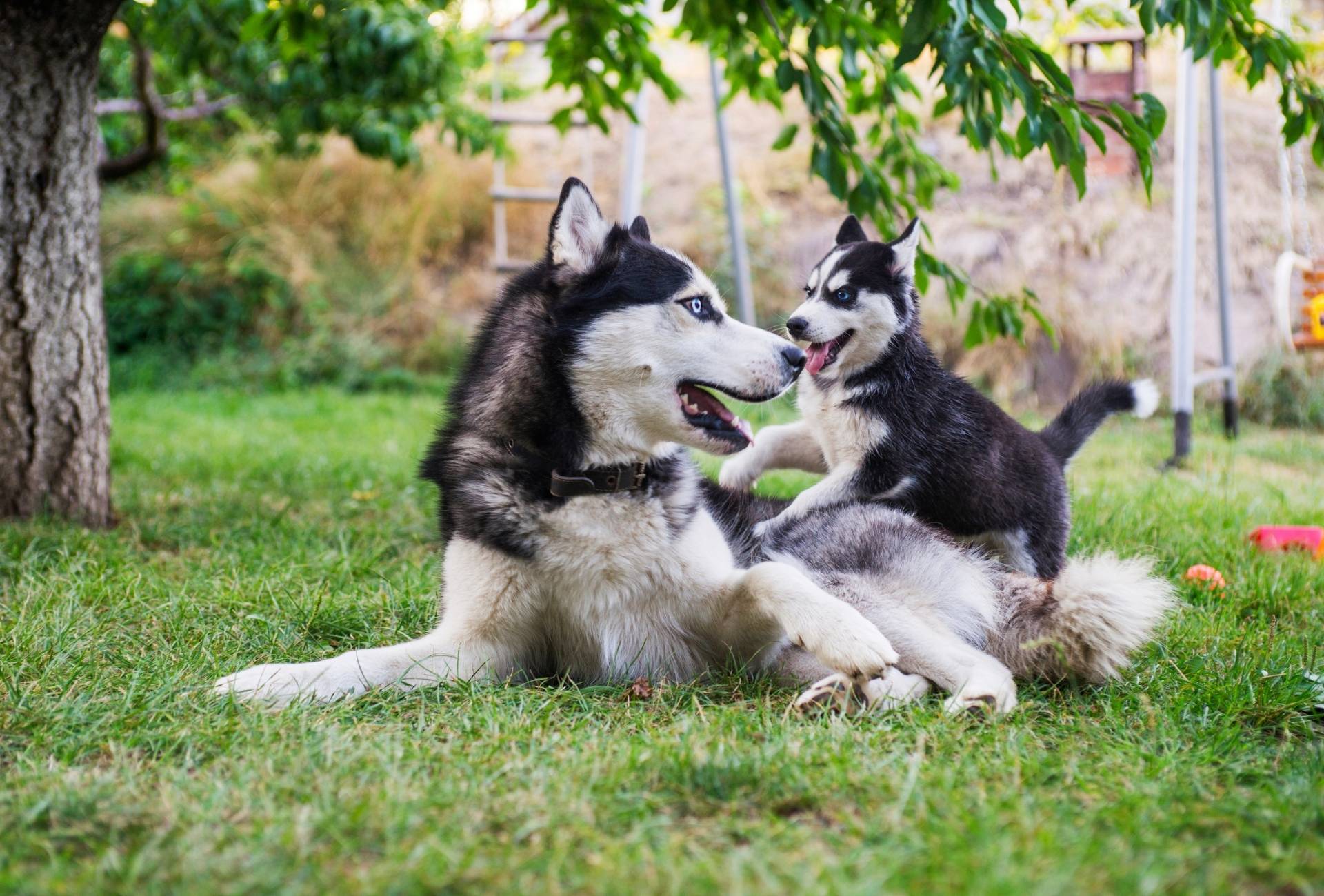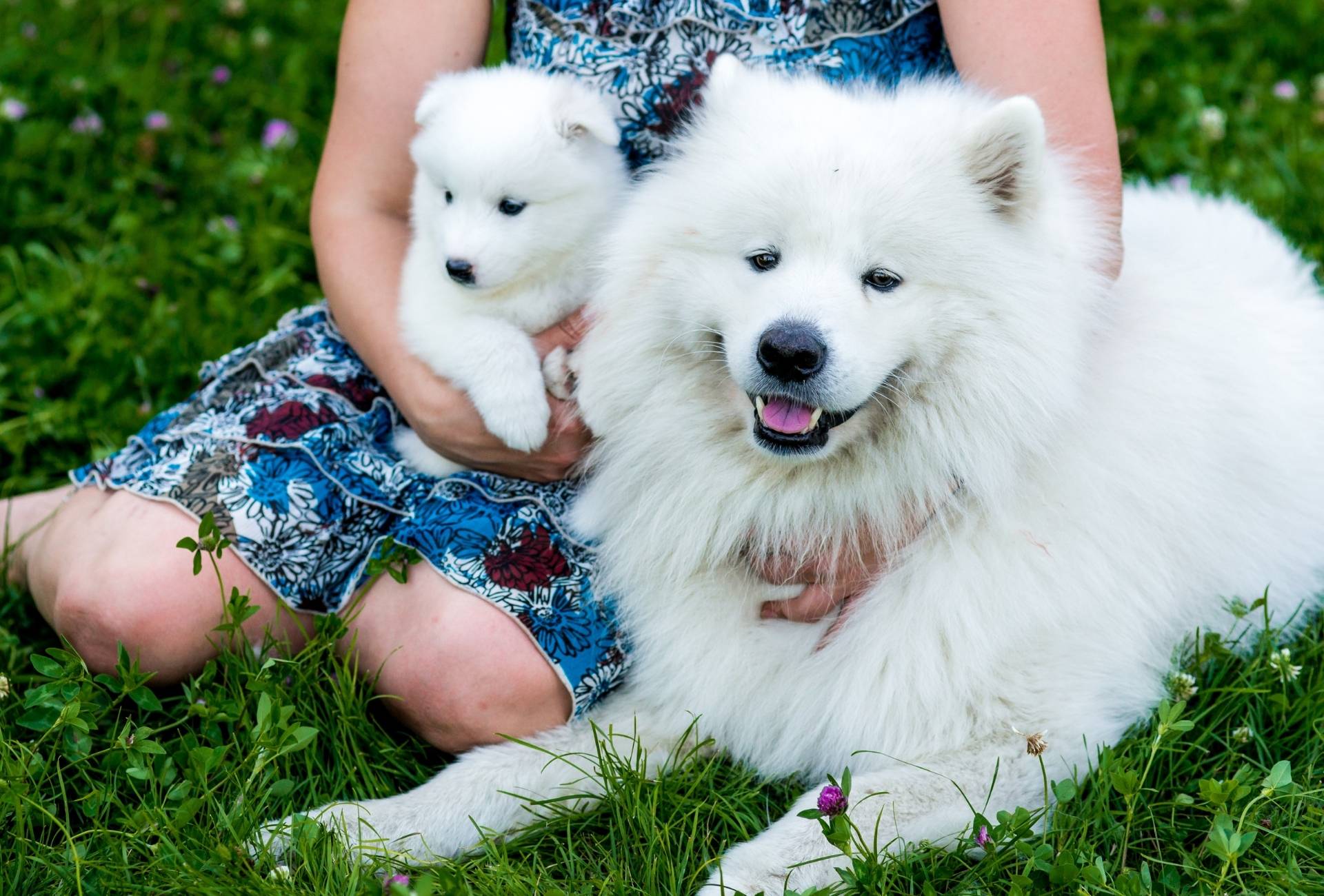Why Is My Older Dog Attacking My New Puppy?
Your older dog is attacking your new puppy due to poor socialization, a lack of patience with rambunctious puppies, jealousy, underlying aggression issues, or medical issues causing pain.
The course of action will depend on the cause.
Older dogs with poor socialization might require positive reinforcement to gradually learn to accept the puppy.
Feeling cornered, jealous, or a build-up of annoying acts are also common causes why older dogs attack new puppies.
You could call that a lack of patience with puppies.

Photo by Andrii Spy_k on Shutterstock
It’s not always just your older dog’s fault though.
Sometimes, this comes with a puppy who is naturally extremely energetic and focused on the face, paws, or tail of your other pooch.
If your older dog isn’t used to having pups in his face or was never really good at it, the tips below will work wonders for you.
Older dogs who are really grumpy about having to share toys, food, or resting spots may benefit from the privileges and 1-on-1 training I discuss below.
Territorial issues require a proper introduction to prevent most issues.
Some dogs are just not suitable for puppies.
If your dog has aggression issues or underlying medical issues, you might put off getting a puppy until these have been fixed.
In short, you need to determine the cause of the bad blood between your canines.
Older Dog Bit Puppy and Drew Blood
If your older dog bit the puppy and drew blood, you need to separate them to avoid future accidents and start aggression training with your older dog.
An incident where the older dog seriously harms the pup is not simply due to the grumpiness that can accompany aging.
Sure, the pup may have provoked a response.
However, a bite that draws blood is not a measured response to a puppy being rambunctious.

Photo by Helen Sushitskaya on Shutterstock
That is unless you suspect your puppy himself is suffering from puppy aggression.
Puppy aggression should be worked on immediately but is usually not the root cause of an older dog biting the puppy.
Your older dog may have been poorly socialized or not properly introduced to the puppy.
A lack of a safe haven, jealousy, and a generally overexcited pup may contribute to the issue.
But there’s really no excuse that an adult dog went for a full-blown bite.
So let’s start improving the relationship and making sure your adult dog never does that again.
If your older dog seriously hurt the puppy, ask yourself the following questions:
All these questions will help determine whether your dogs may have been poorly introduced, your older dog is not familiar with pups or perhaps even unsuitable, or if there have been signs all along.
Your ultimate goal is to get your older dog to accept your puppy.
By following the steps laid out above, most owners are able to achieve that.
However, since an actual bite has happened, you may have to take a step back and evaluate whether your older dog is suitable for a puppy.
If chances are high your dog will attack the young one again, you’ll have to hire a professional trainer.
Help, My Older Dog Is Attacking My Puppy!
Your older dog attacking your new puppy may have been the last thing you had on your mind. Perhaps you got the puppy to keep your dog company and to enjoy watching them romp around and play, or perhaps to help your older dog perk up, so to say, “rejuvenating” him a bit, bringing a fresh new lease of life.
Instead, your older dog seems to not want anything to do with the puppy and even growls when the puppy approaches. Now, thoughts about having made a big mistake cross your mind as you start having flashes of years of trouble ahead or even thoughts of re-homing your new puppy.
“What did I get into? Life was so calm before bringing this puppy into the home. Is my older dog meant to live as the only dog? Why is my older dog so non-accepting of this puppy? What gives? And most of all, what can I do to stop my older dog from attacking my new puppy?”
These are all good questions that many owners of new puppies wonder about. As upsetting as this can feel, the truth is that older dogs often have a hard time adjusting to changes, and bringing a boisterous puppy into the household is not without stress.
Bringing a new dog into a household, where a resident dog has been living for many years as the “only dog” is stressful enough, but if the new dog in question happens to be a puppy, then the stress may be much higher.
Lets face it: The introduction of a boisterous puppy can be quite a stressful event, even if the resident dog is not very old. When dogs are stressed, they have a harder time coping with certain situations, so theyll be quick to lash out than when they are calmer.
Dogs like routines and get set in their ways and a new puppy can be felt as an interference. Unless you take several steps to introduce your new puppy to your older dog, chances are things may not go too well during the adjustment phase.
On top of the stress though, what are other possible reasons your older dog is having such a hard time getting along with the puppy? If you have watched your new puppy and older dogs interactions carefully, you may have noticed certain patterns. Here are some common dynamics.
Puppies are full of energy and all they want to do is sleep, eat and play. Even the mother dog grew tired at some point and had her limits as her puppies started growing and tugging at her ears and tail or trying to nurse with their sharp teeth!
So your boisterous puppy may keep on trying to interact with your older dog when all your older dog may want to do is perhaps rest or enjoy some quiet petting time with you as you both watch the sunset. So if your older dog is growling when your puppy is trying to interact, its likely his way or telling him to stop.
For sake of comparison, imagine having a toddler go visit grandma and him repeatedly doing things that annoy her. Sure, grandma may have a halo over her head, but her patience will surely have a limit!
In many cases, older dogs do grant puppies whats known as a puppy license, meaning that they let them get away with things they would never let adult dogs get away with, but not all adult dogs are willing to grant it.
Dogs who arent very playful or social to start with, or dogs who are aging and have less mobility, will struggle if a puppy keeps on pestering them. They may try to move away, but the puppy keeps on going thinking its all a fun game. Not the type of “retirement,” older dogs were likely wishing for!
Does your older dog attack your puppy when your puppy gets too close to his food, a favorite toy, a resting place or you? If so, your older dog may be resource guarding.
Resource guarding, as the name implies, takes place when a dog is protective of things they perceive as valuable. Freezing, growling and showing teeth are distance-increasing behaviors of dogs who are uncomfortable with another dog getting too close to their perceived belonging and its their way of sending them away.
Adult dogs usually know better than to approach another dog who is eating, has a toy or is sleeping (unless hes looking for trouble), but puppies are socially-illiterate beings that need to learn more about body language, giving space and respecting social boundaries.
As mentioned, in general, older dogs grant puppies a puppy license, but these licenses also tend to expire as the puppy matures. As puppies grow, they are expected to learn more about respecting certain boundaries and responding to certain social cues and postures.
However, it is also true that, as puppies grow and reach doggy adolescence (which, in most dogs starts around the age of six months), they can also turn into bullies and start engaging in pushy behaviors. More conflict down the road may be expected as they reach social maturity around the age of 12 to 36 months of age.
This may be especially true of female dogs. Many female dogs living in the same household start fighting around this time.
This may sound quite funny, but my adult female Rottweiler at the age of 2 developed some sort of phobia of puppies. As soon as puppies were approaching her, she would walk the other way trying to avoid them as much as possible. If the puppies cornered her, she would growl and threaten to bite.
I chalked it up to her personality: she was a very calm dog who had a hard time tolerating rude dogs who would “come on too strong” in their approach, jumping and wanting to meet face-on. The same goes for puppies.
Some dogs may be particularly intolerant of puppies and may get very stressed when exposed to them. Some dogs even fear them. It could be they werent socialized much with dogs or they simply have lower tolerance levels for certain behaviors.
A dog who is stressed or fearful can bite and even severely injure a puppy. This is something to watch out for, which is why its so important to always monitor all interactions and become your older dogs ambassador, protecting him from undesirable exposures.
If you are unsure whether your older dog and puppy have good chances of getting along, play it safe and have them evaluated by a dog behavior professional. He or she can make specific recommendations and if things may not work out, you may have to make an important decision as to whether you should re-home the pup or return him to the breeder.
Why Do Puppies And Adult Dogs Fight? How To Handle The Situation.
For many a dog lover, one dog often just isn’t enough. Unfortunately, sometimes when they bring a new puppy home, they often encounter problems with their old dogs. In fact, there have been plenty of people around me who have had (according to them, at least) to give up the new puppy because their old dog just didn’t let the poor thing breathe.
When I find out about their problem of an older dog attacking new puppy, my question is always, “are you sure you did everything you could?”
Look, I want you to understand that I’m not asking this is out of malice. I’m not shifting the blame to you to make you feel bad. But it is our job make these two dogs get along.
I’m sure you’re excited about your new family member, and even the thought of having to give them up hurts. But here’s the thing: you might be giving up far too quickly.